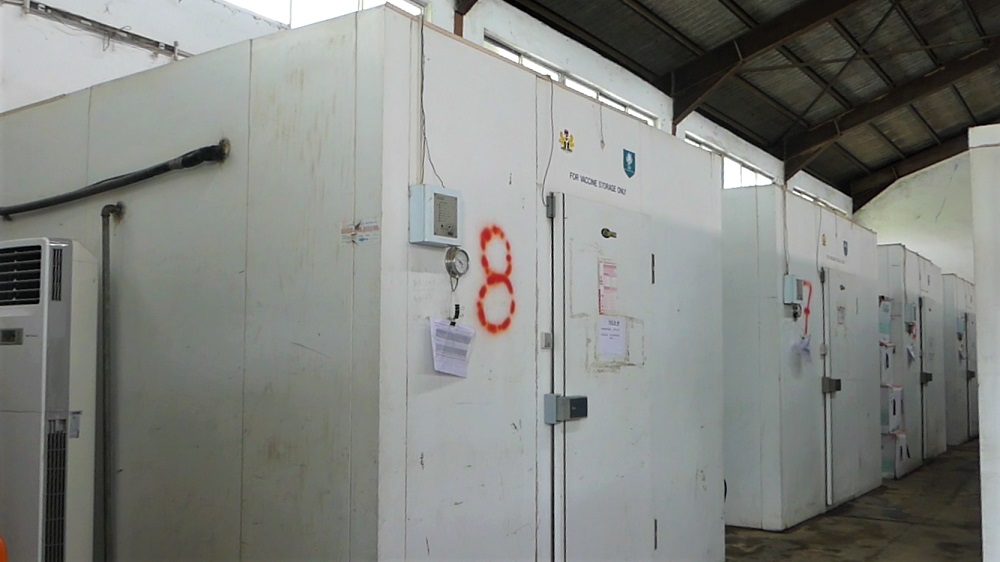A first batch of 177,600 doses of Johnson & Johnson’s single-dose vaccine against COVID-19 arrived Nigeria on Thursday and there are efforts to commence vaccination in hard-to-reach areas, starting from next week.
It is Nigeria’s first consignment purchased through the African Vaccine Acquisition Trust (AVAT), a trust launched by the African Union and UNICEF, to ensure member states have access to affordable COVID-19 vaccines.
More shipments are expected, reaching a total 1,173,132 doses this August alone.
Regular shipments will continue to come in every month until Nigeria reaches a target 29.8 million doses.
The target is to deliver 50 million doses before December end.
By January next year, the country is expected to be getting over 25 million doses in shipment each month.
The shipment of Johnson & Johnson’s brand of COVID-19 vaccine joins last week’s delivery of Moderna vaccine and comes ahead of a shipment of AstraZeneca vaccines next week.
All three will be offer for the rollout.
But the J&J is the only single-dose vaccine against COVID-19, requiring individuals to take only one shot. Other vaccines require more than one shot—a starter shot, followed by a booster shot after an interval.

Emergency use
The World Health Organistion listed it for emergency use in March, and it has already been authorised in US and Europe.
The National Primary Health Care Development Agency, which coordinates vaccination, says the “single-dose” nature of the J&J vaccine is a benefit for hard-to-reach communities and people across the country.
“We mean riverine areas, peasant communities, security-compromised areas,” said executive director of the agency, Faisal Shuaib, during a visit to the agency’s Abuja cold-chain store, where the vaccines are stored against rollout next week.
“These are people who will find it difficult to leave their homes for a second dose after taking the first one.
“The availability of different vaccine brands does not in any way mean that some category of people are being selected for high-quality vaccines while others are targeted for low-quality vaccines.
“All vaccines approved by WHO and NAFDAC are safe and can deliver adequate protection against COVID-19,” explained Shuaib.
The single-shot nature of J&J means they are easier and cheaper to administer. They have a longer shelf life, up to six months, and can be stored at temperatures of +2 to +8 degrees Celsius—temperatures the country’s cold-chain storage already uses for existing vaccines used in routine immunisation.
A third factor AVAT considered was the vaccine was partly manufactured on the Africa continent—with a sub-dose from the US and finishing components at Aspen Pharmacare, based in Durban, South Africa.
Target vaccination
AVAT is the AU’s move to complement initiatives such as COVAX for the continent to attain a target immunisation of 60% of its population. The $20 million trust if funded by the Afrexim Bank, with logistics provided by UNICEF.
It was set up last November under the AU chairmanship of South African president Cyril Ramaphosa, ensuring AU states have access to some 220 million initial doses—with an additional 180 million doses.
“It is the first time Africa has undertaken a procurement of this magnitude,” said Abdullaye Kone, regional chief operations officer for Anglophone West Africa at Afrexim Bank.
“It also marks the first time AU member states have collectively purchased vaccines to safeguard the life of African populations.
It is estimated the 400 million doses agreed so far are sufficient to immunise a third of Africa and bring it halfway to the continental goal of vaccinating at least 60% of its population, said Kone.
Shipments began this August with 6.4 million doses – and have gone out to Egypt Lesotho, Angola, Mauritius and Ghana before Nigeria.
“We are proud to see the vaccine arriving. It is a sing of hope that we will finally be able to close the vaccination gap between Africa and other parts of the world,” said Amadou Cisse, of Africa Centre for Disease Control.
“This vaccine will help us save lives and livelihoods and resume our race toward our particular development agenda.”
Rising cases
By August 11, a total 179,908 cases of COVID-19 infections have been confirmed and 2,195 Nigerians have died since the start of the pandemic.
Two days before, the Nigeria Centre for Disease and Control announced the first confirmed case of the highly transmissible COVID-19 Delta variant.
The rising cases have been linked to poor adherence to public-health and social measures, and the emergence of a variant.
Nigeria has been ranked fourth among top-10 countries globally on account of its response to the pandemic.
But WHO maintains vaccines are safe and effective for preventing the severe disease, hosptalisation and death—and are critical in the battle against COVID-19.
With J&J being the only single-dose vaccine approved for emergency use yet, “the vaccine may be an important tool for accessing hard-to-reach populations, thus playing a key role in preventing infections and reducing deaths,” said Walter Molumbo, WHO country representative in Nigeria.
“This pandemic still has a long way to run. Nigeria is already experiencing a third wave. We need to work together to ensure all preventive measures are put in place and maximised to reduce the impact of COVID-19 on our lives.
“Vaccination is one of the tools we need to scale up to ensure that the entire population is protected until such time that we reach herd immunity.”

 Join Daily Trust WhatsApp Community For Quick Access To News and Happenings Around You.
Join Daily Trust WhatsApp Community For Quick Access To News and Happenings Around You.


